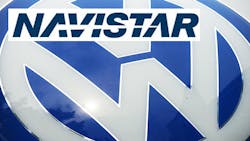Volkswagen AG will buy a stake in Navistar International Corp. to gain a foothold in the U.S. heavy-truck market, taking a gamble on a struggling U.S. manufacturer as the German company still grapples with the fallout from the emissions-cheating scandal. Navistar shares soared as much as 67%.
VW will pay $256 million for a 16.6% holding and assume two board seats as part of a deal that includes technology sharing and joint purchasing, the companies said Tuesday. The Wolfsburg-based automaker will pay $15.76 a share, 12% more than Navistar’s most recent close. The holding, which VW said it may increase later, puts it on par with the largest shareholders, activist investors Carl Icahn and Mark Rachesky.
“Navistar has always made sense as an expansion target for Volkswagen, which has no presence in the North American commercial-vehicle market,” said Brian Sponheimer, a Gabelli & Co. analyst in Rye, New York. “And Navistar has been burning through cash. This allows dealers to tell their customers that Navistar will be here, in the North American market, well into the future.”
Gaining traction in the U.S. heavy-truck market, dominated by Daimler AG, Volvo AB and Paccar Inc., is key to VW’s plan to forge a global commercial-vehicle operation with higher profit margins than rivals. The marriage isn’t without risk given Navistar’s shrinking market share in the U.S. Even before the diesel-cheating scandal, Volkswagen’s car sales were slipping behind competitors in the region.
“Closer collaboration among our existing brands was a top priority for our commercial vehicles business and we are well on track in this context,” Andreas Renschler, head of the Volkswagen Truck & Bus division, said in a statement. “We are now taking the next step on our way to becoming a global champion in the commercial-vehicles industry.”
“Navistar has a volatile history and struggles with eroding market share,” said Roman Mathyssek, a consultant with Arthur D. Little in Munich. “Via know-how from their truck brands Scania and MAN, VW could unlock value at Navistar.”
Working with Navistar will provide VW with access to technology and designs targeting customers in the U.S., where model lines are very different from offerings in the rest of the world. Many U.S. truck drivers prefer vehicles with an elongated nose, while European operators buy trucks with a flat face due to length restrictions. Volkswagen, Europe’s biggest carmaker, hired Renschler away from Daimler’s truck unit to push a stalled plan to deepen cooperation between its MAN and Scania brands.
Munich-based MAN and Swedish counterpart Scania don’t sell vehicles in the U.S., and the group’s only other large truckmaking operation is a VW-brand division in Brazil focused on Latin America. MAN has a Chinese joint venture with local affiliate Sinotruk Hong Kong Ltd. that sells models in Asia. Entering the U.S. will give VW access to a market a bit smaller than its current home region. Around 240,000 trucks will be sold this year in the U.S., while 290,000 will be bought in Europe, according to estimates from Volvo.
Volkswagen Truck & Bus was created in 2015 after the carmaker accumulated majority control of MAN and Scania over the previous decade. The unit has been largely unaffected by the diesel-emissions scandal that erupted at the group’s car operations a year ago. It’s targeting 1 billion euros ($1.12 billion) in long-term cost savings through closer collaboration among its brands.
Renschler reiterated in a conference call with analysts Tuesday that VW is keeping all options open as part of his expansion strategy, including increasing its stake in Navistar and a possible share sale of VW’s trucks division. But Renschler indicated an initial public offering might not be imminent as “VW has no actual plan” to spin off the unit.
VW and Navistar said they expect to reap combined synergies of $500 million over the next five years. Navistar posted its first profit in 14 quarters in the three months through April, helped by spending cuts under CEO Troy Clarke.
Navistar is no stranger to dramatic consequences from emissions-related troubles. The truckmaker had to kill most versions of its so-called premium vocational models in 2010 because they lacked diesel engines that complied with U.S. federal air-pollution rules. Navistar’s market share has tanked since its pollution-control technology failed to meet industry standards and brought the company to the brink of collapse.
“We’re making great trucks,” Clarke said on the call with analysts. “But this is another great reason to consider our products — that you want to do business with somebody who is going to be participating in leading global technologies, and will have that kind of scale going forward.”
The two companies are starting joint work now on new global engine programs, and some VW engine components will start appearing in Navistar’s U.S. products in 2019. Clarke said that it’s logical to think that Navistar could build Volkswagen engines in the U.S., but that no decisions have been made. Clarke also said he had no change to announce on Navistar’s contracts with Cummins for engines.
Icahn said in a regulatory filing Tuesday that Navistar agreed that the company won’t support any person who seeks to increase the size of the board to more than 12 directors, as long as an Icahn nominee is a member of the board. Navistar currently has nine directors.
The U.S. company said in a separate statement Tuesday that two directors, James Keyes and Michael Hammes, will retire when shares are issued to Volkswagen or at Navistar’s 2017 shareholders meeting, whichever comes first.
By Christoph Rauwald and John Lippert
About the Author
Bloomberg
Licensed content from Bloomberg, copyright 2016.
